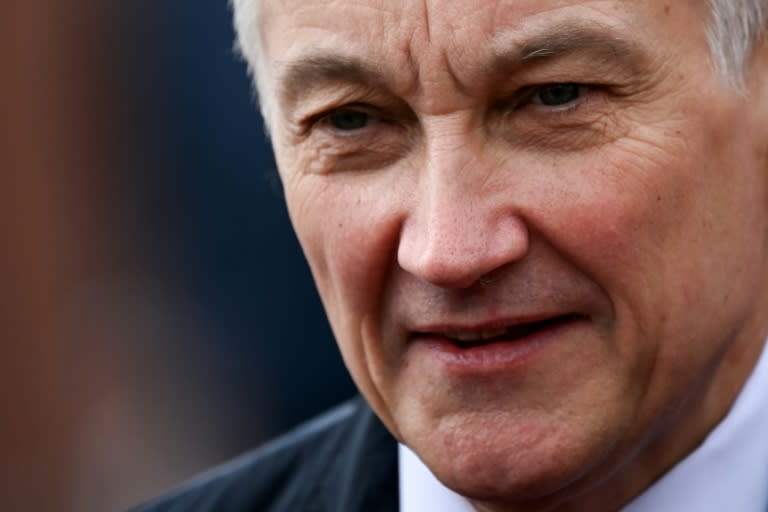Putin's defence shake-up: 'Preparing for a long confrontation'

- Oops!Something went wrong.Please try again later.
- Oops!Something went wrong.Please try again later.
- Oops!Something went wrong.Please try again later.
- Oops!Something went wrong.Please try again later.
- Oops!Something went wrong.Please try again later.
President Vladimir Putin's nomination of top economic official Andrei Belousov as defence minister is a sign of the importance the Russian leader places on the war economy in gaining the upper hand in what he expects will be a long conflict against Ukraine, analysts say.
It is unclear if outgoing defence minister Sergei Shoigu's move to head the national security council is a demotion, while the future of its previous chief Nikolai Patrushev, a shadowy but powerful figure and an ardent hawk, is also murky.
The changes, announced just days after Putin was inaugurated for an unprecedented fifth term following March elections denounced as rigged by opponents, come as Russia is seeking to rattle Kyiv with advances into northeastern Ukraine.
- Why Belousov? -
Andrei Belousov has since 2020 occupied the post of deputy prime minister in charge of the economy. Like his immediate predecessors as defence minister he has no background in the military but also no past in the Russian security services.
His priority at a time when Russia is planning to ramp up the defence budget to account for some 30 percent of total government spending will be to fine tune procurement and boost the domestic defence industry to win success on the battlefield.
Putin "needs to shift even further to a war economy and efficient military spending -- and Andrei Belousov is one of his most trusted economic officials," Ben Noble, Associate Professor of Russian politics at University College London, told AFP.
In an unusual late-night briefing to explain a decision that initially stunned many observers, Kremlin spokesman Dmitry Peskov said Putin had chosen Belousov to ensure the defence ministry was open to "innovation".
"Putin's goal is to enhance arms production effectiveness and optimally meet military needs," wrote Tatyana Stanovaya, founder of the R.Politik consultancy. "In this context, Belousov is a logical choice."
- What now for the war? -
Analysts said that the appointment indicates that the Kremlin is preparing Russia for a years-long war against Ukraine where the balance in weapons supplies and production may determine who emerges triumphant.
"The main takeaway is that Vladimir Putin is hunkering down for a long confrontation with the West," said Noble.
Russian-language news site The Bell quoted a source as saying that Belousov is an eager believer in the doctrine that Russia is encircled by a "ring of enemies" and the only figure among Putin's top economic team to support the 2014 annexation of Crimea which was followed by severe sanctions.
"The main conclusion that can be drawn from a competent civilian economist taking the helm of the defence ministry is that the Kremlin is consistently preparing for a protracted war with Ukraine," it said.
- The fall of Shoigu? -
Shoigu, a prominent figure in the Russian government even in the 1990s before Putin rose to power, was always seen as a comrade of the president with the pair sharing saunas and bare-chested expeditions in the wilderness of the outgoing defence minister's native Siberia.
Those days are long gone, with Shoigu's reputation suffering after the blistering diatribes against him by mercenary chief Yevgeny Prigozhin -- who called the minister a "dirtbag" before his death in an air crash in August 2023 -- and the arrest of deputy defence minister Timur Ivanov on suspicion of taking bribes.
But Shoigu has not been removed from the elite, with Putin nominating him as head of the national security council.
The move "should not be seen as a demotion, but it remains to be seen what practical political and policy roles he will play," said Noble.
There are doubts over the future importance of the council, whose deputy chief is former president Dmitry Medvedev now best known for sometimes apocalyptic broadsides on social media rather than political influence.
"This appointment also indicates that the actual significance of the security council in the hierarchy may not be as great as observers typically assume," Stanovaya said.
- What next for Patrushev? -
A figure who rarely speaks in public, Patrushev has always been regarded as a significant player and one of the biggest proponents within the Russian elite of the "ring of enemies" doctrine.
In a striking development, his son Dmitry, formerly agriculture minister, has been promoted deputy prime minister in charge of natural resources and agriculture in the same reshuffle.
Peskov appeared eager to create a deliberate ambiguity around the future of Patrushev, saying he had been relieved of his current duties "in connection with taking on a new job" which would be revealed in the "next days."
- Who is running the war? -
With Belousov an economist with no military experience, the decision further distances the defence ministry from battlefield decision making and reinforces the power of the military general staff.
The future of Russia's chief of staff General Valery Gerasimov has been in doubt for months after he disappeared from public view but he remains in his post after the reshuffle.
"The military has always been the prerogative of the chief of the general staff, he will continue his activities, and no changes are for now envisaged in this regard," Peskov told reporters.
sjw/jh/ach

